As a volunteer-driven event and organisation, AfrikaBurn offers many ways in which anyone can participate. A good starting point would simply to ask yourself what it is you’d like to do, and see where that skill or contribution would fit. Take a look at the following areas, find one that suits you, and then step up, rock up and prepare to have a lot of fun.
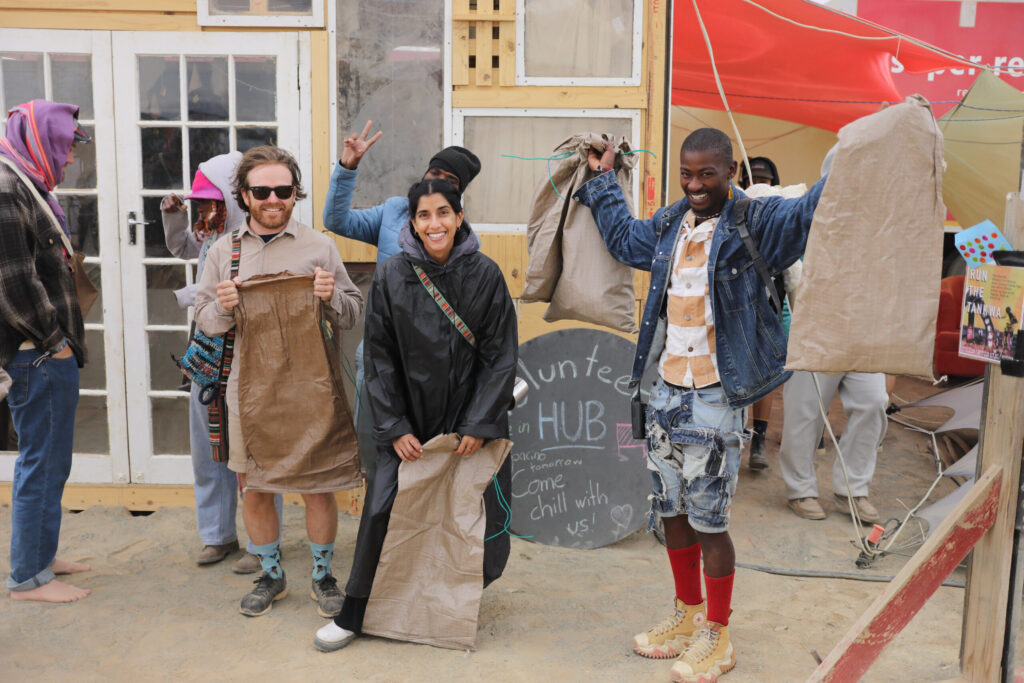
For a start there’s a host of volunteer roles that need filling at the event each year – and there’s a full list below where you can read about those, and sign up. You can pick your own shifts, and choose what suits you.
If you’re not sure what you want to volunteer for, no problem – you can hop on over to the Volunteer Facebook page, and check out what they’re looking for right now, or get in touch with [email protected] and they’ll help you find your niche.
There’s many areas we need assistance with, but there’s three major areas with the most guts and glory. That’s Rangering, Sanctuary and DPW. Check them out below:
Tankwa Town Rangers are participants who volunteer a portion of their time at AfrikaBurn in service of the safety and well-being of the AfrikaBurn community. Rangers – also known as The Orange – act as non-confrontational community mediators, providers of reliable information, facilitators of public safety, and promoters of the eleven guiding principles upon which AfrikaBurn is based.
Day and night, pairs of Rangers can be found walking and bicycling throughout Tankwa Town, engaging with the community, enjoying the art, and helping participants respond to situations that can range from directing people to the nearest loo to finding lost children, managing burn perimeters, and supporting overwhelmed participants.
Rangers are not a security force. Our event has accredited security that are hired for the period, and they are there to lock down the gate if required and back up the Rangers under extreme circumstances. Within Tankwa Town. ‘law and order’ is maintained by two assumptions. First, Radical Self Reliance means that each participant is responsible and proactive in terms of their own well-being and, in terms of Participation and Civil Responsibility, proactive in terms of the well-being of others. Second, the volunteer-based Ranger organization takes responsibility for working with participants to identify risks, dangers, or hazards, then working with the appropriate departments to minimize, manage, or mediate them.
Becoming a Ranger entails coming to a five-hour training session and then signing up for at least one shift at the event. The more shifts, the more events, the more experience, and the more roles you learn, the more you can contribute to your AfrikaBurn community as well as your own communities and workplaces.
Rangers work within one or more of six organisational roles at the event:
Dust Rangers form the core of all Ranger services. These Rangers walk around, talk to people, visit, interact with AfrikaBurn and all its art, advocate for the 11 Principles, and apply them with compassion where and if needed. These Rangers are the eyes and ears for the whole Ranger crew. They know much about Tankwa Town because they see it all first!
Specialise in helping participants through difficult situations that have a strong emotional or internal component. Green Dots are patient listeners who seek to hold space for participants undergoing inner transformation or experiencing internal or emotional distress.
Fire Perimeter support burning art projects by managing a perimeter between participants and open flame. They work closely with the artists and Fire Safety to organise, train, and deploy Rangers around a burn site.
Knowledgeable and experienced support in the field for other Rangers by offering face to face advice, backup, and coordination support.
Supporting Rangers on shift. At Ranger Headquarters, Tortoise – the call sign for Shift Leads – monitors the Ranger radio channels. When needed, they secure resources to support situations and communicate with other departments to ensure timely response to incidents.
Ranger One is a very special role for seriously experienced and capable Rangers. As the top Ranger on duty, they advise the Shift Leads on complex issues and work with other departments to deliver the best response possible to difficult community situations.
With our city population growing each year, we need more Rangers in Tankwa Town than ever before. We are always looking for qualified Rangers to staff over four thousand hours of shifts during the event.
If you, or anyone in your camp or crew, are interested in stepping up, please feel free to join us at the various training dates planned throughout the year in various South Africa cities, or join us at a training at the event. We all hold the space together, and together can we hold it right.
Have further questions about Rangers? Mail us on [email protected]
Interested in becoming a Ranger? Check out the following Training dates below.
These dates and times are still to be announced.
All training sessions happen in the Training Tent at Off-Centre Camp.
When they’re open, you’ll be able to click below to sign up for shifts.
It’s a calm place of safety where anyone having challenging experiences in the dust (and at our events elsewhere) are able to be helped.
Participants can often become overwhelmed by the extreme desert conditions: wind, dust, soop (sound out of place), temperatures, intense partying and the stress of camping.
Radical self-reliance when things get hectic can look like leaning on camp mates, neighbours and friends, asking for help, and figuring out ways to prevent common challenges before they happen. Sanctuary, created by both the org and the community as a gift of support to Tankwa Town, is one of the places to come and ask for help.
Sanctuary offers a safe and supportive space at Off Centre Camp between Medics and Ranger HQ, to regain balance through peer support and practical help with wellbeing like rest, refreshments and care. Sanctuary also works with the operations team to put prevention strategies in place to reduce future community challenges.
There are 4 roles open to volunteers that meet the approval criteria:
Shifts are 24/7 beginning when the gates officially open, and ending on the Monday of Exodus, 6 hours long:
6:00 to 12:00
12:00 to 18:00
18:00 to 24:00
24:00 to 06:00
To sign up for a Sanctuary shift you need:
NB: It would be super if you had previous harm reduction, medical, mental health, and/or psychological counselling experience (psychiatric nurses, psychiatrists, psychologists, registered counsellors and social workers most welcome).
DPW are our Department of Public Works, and they’re spoken about more over here.
To make Tankwa Town function smoothly takes a small army of volunteer to fill over 3,000 shifts – and every year we have an amazing showing by many people, but there are always a lot of shifts left open that you could help with.
Afraid not: our event takes place on a private nature reserve, which means that no pets of any kind are permitted. RIP Maffy The Rat, 2011.
There are loads of reasons – firstly, it’s great fun and you get to meet loads of people. Volunteering also gets you involved in the do-ocracy that creates the magic of Tankwa Town. Volunteering also embodies the principles of gifting, civic responsibility, decommodification – and best of all you’ll feel great for doing it.
Please email the volunteer team – or alternatively, sign up at the event by heading over to the Volunteer booth at Off-Centre Camp to see what needs doing.
The great feeling that you are a huge part of team. You might also receive a MOOP bag and various items depending on how many shifts you complete.
Oh, and a network of close, connected friends from around the planet. People you’d never meet in the default, with whom you’ll do things that you never thought possible.
Hell, yes! It’s the best way to learn about how things work, meet new people and complete your experience.
Absolutely: all the available shift descriptions can be found below. Still uncertain? Mail [email protected]
Sorry, no. Only by having volunteers fill over 3,000 shifts can we keep ticket prices as low as possible.
For sure – we welcome it. Get in touch with us at [email protected] to find out how.
Depending on what your skills are and how you wish to volunteer, we’ll find activities in your area and match you. Please email [email protected] and let them know of your wonderful offer.
Head to Off-Centre Camp 15 minutes before your shift starts and check in with the friendly Volunteer Booth crew.
Absolutely, yes. Head to the Volunteer Booth at Off-Centre Camp and find out what is still available.
One beauty about volunteering is you get to choose how you would like to gift your time. You’re welcome to volunteer for anything that interests you.
Shift times vary from 2 hours to 6 hours, depending on what you choose to do.
Yes in two ways, either by attending a briefing beforehand – which some portfolios do, and others you will be shown the ropes when you arrive.
Yes, and details can be sent to you. The details will also be here on our site and if you missed any of those, then go to the Volunteer Booth and find out when the trainings are scheduled.
For info on our Ranger Training dates click here, and for info on Sanctuary Training click on over this way.
Take a look at the list of registered theme camps here and contact them directly.
Sure – mail [email protected] and they’ll get back to you.
Yes. We hold a few before the event in Cape Town and in Joburg. We’ll be putting those dates on our site, on social media and also will email you directly. You can also keep an eye on upcoming Volunteer Days at our HQ on the Volunteers At AfrikaBurn Facebook page.
Yes you may. You can either change it yourself through sign up genius on line before the event or come straight to the Volunteer Booth at Off Centre Camp. However please, no changes if there are less than 24hrs before your shift
Consider doing one at another time or looking at the many other volunteer roles available.
That’s easy. Sign up together or come speak to the Volunteer Booth crew at Off-Centre Camp.
When shift lists on our Participation page are open, you can check shifts and who else has signed up.
If you’re at the event and cannot remember come to the Volunteer Booth at Off-Centre Camp anytime – the shifts are on a notice board right next to the Booth.
Check up on the sign up genius page, when you log in, it will inform you of the shifts you have signed up for. Any problems please write to [email protected] or come along to the Volunteer Booth at Off-Centre Camp at the event.
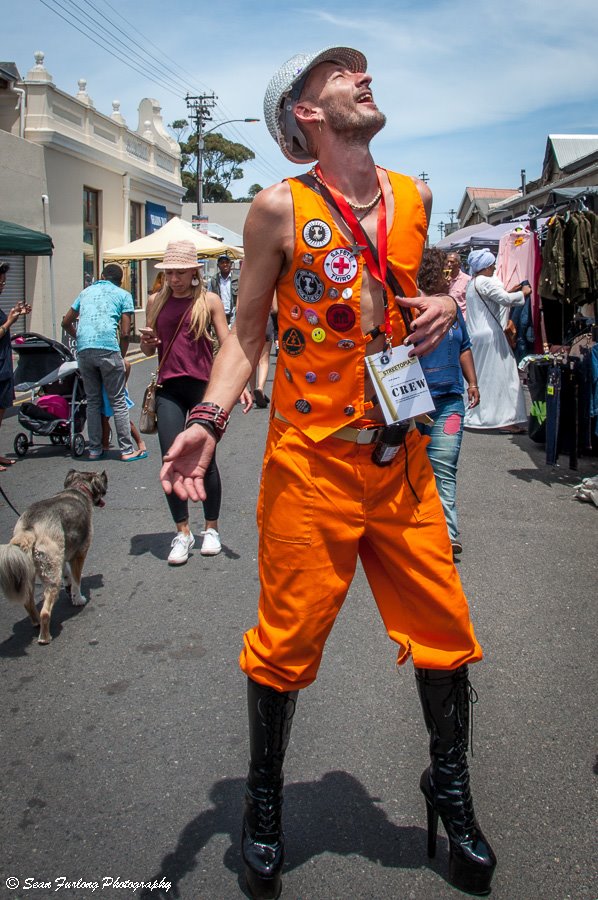
Working here means you’re the reception desk for arriving artists and theme camps, both registered and unregistered. You’d get to help them locate their designated spots (or find them one). This is a great way to meet the people that create the magic of Tankwa Town.
More information: [email protected]
The Artefactory is a museum of all things AfrikaBurn. It’s a mélange for explorers seeking to learn its history, the 11 Principles, previous events, creative initiatives and Miss Nesbitt’s memoires, all of which are showcased in displays within a giant shipping container. It also features the best rooftop viewing deck where you can sit and watch things happen out of the blue.
If you have ever wanted your own night at the museum tale, or just wanted to be a part of telling this maginificent story, come work at the Artefactory for some curatorial cosiness.
A shift in the Box Office takes you out of the desert elements for 4 hours and puts you into the hot seat at one of the Box Office windows, scanning the many burners arriving in the desert into Tankwa Town.
Some shifts are extremely busy, and some are quiet, so be prepared to work both eventualities. It’s always fun working a Box Office shift, and we invite you to join the Box Office furniture. You may even get a shirt out of it!
For more info, send an email to: [email protected]
CHILLAZ, situated at the epicenter of the Off Centre, exists as a hub and a platform for all artists, performers, and creatives looking for a stage in dusty Tankwa Town.
Chillaz is looking for volunteers to fill various roles during their event, including stage manager, technical support, fluffers, artist booker, and stagehands.
Love the smell of LRP in the morning?! Why not hitch a ride on the back of a butterfly, a bumblebee or a unicorn? Come meet the builders, artists and creators, get to know them and be inspired to maybe build your own. So get on the highway, point yourself our way, DMV awaits.
Volunteer for registration here.
And if you’re a strong super shift lead, click here.
Our DPW are responsible for creating the key infrastructure of the event: roads, signage, toilets and much more. Like getting your hands dirty? Your skills will be put to good use working with the DPW.
In order to take on the role of being DPW crew volunteer, you’ll need up to five weeks free time out in the Tankwa Karoo.
Read more about DPW here, here and here. The form is on one of those pages – consider finding it the first part of your application process.
Beyond chopping vegetables and preparing meals, it’s an invitation to shape the communal spirit and radical self-expression that define AfrikaBurn. Join a family of like-minded individuals, where every task contributes to the vibrant tapestry of this temporary city in the Tankwa Karoo.
The application process for kitchen is the same as for DPW, so follow the links on those pages.
For more information, email [email protected]
When people arrive with Tankwa stars in their eyes, this is the crew that processes them and their tickets. It’s a great way to meet loads of people, and share in the stoke of arrival. Sound good? It is good.
You shall not pass!
Bubbly? Enthusiastic? Fancy welcoming the citizens of Tankwa Town with a smile, song or dance? Perfect. Get to dress up and welcome, orientate and inform people as they arrive.
They dish out the coolest – and only – product sold in Tankwa Town. It’s a great way to meet people, and earn the undying admiration of thirsty and hot burners.
Ice Ice Baby
Every year, behind the scenes, the hard-working Kitchen Crew swings into action to keep the AB staff steady on their feet 24/7 by keeping them fed and well-hydrated. Even if you’re a kitchen novice, come and help prep, serve, and of course, clean up. You’ll have unique, behind the scenes, interactions with folk from all over the world who make AB happen.
Our Just In (e) booth is where all the missing things are collected. From lost cameras to lost minds, you can find it all here. Shifts involve manning the booth, receiving lost items and logging them and then reuniting people with found items.
Contact [email protected] for more details.
The Tankwa Karoo is a pristine environment, but all the stuff that hits the ground has to be removed, and despite the fact that AfrikaBurn is a Leave No Trace event, some people don’t read – or sometimes forget – the manual. Which is when MOOP happens. (Matter Out Of Place)! Got some karma to earn?
In keeping with our core principle of ‘leave no trace,’ we are firmly committed to the responsible management of waste.
The art of waste separation and recycling is a pivotal element of our overarching sustainability mission, and its success depends on the dedication and collaborative efforts of individuals like yourself.
Rangers aren’t the police or security, but rather there to make sure everyone has a good time and doesn’t get hurt. They’re active participants in the community, who promote awareness of what AfrikaBurn is all about and point out potential hazards. Rangers walk about, engage with the community and mediate where necessary.
So if you enjoy assisting others, guiding the odd burner through a difficult circumstance and generally enjoy keeping the peace, you’re Ranger material. But bear in mind you must be calm, flexible and have a sense of humour.
Meet up with Rangers here: Info & Training Page
Learn a little more about them here, here, and even here.
It’s the place where anyone can go if they’re having a hard time, or feeling overwhelmed. If it’s a physical or psychological challenge people are facing and it’s too much to handle, our Sanctuary crew will be on hand to assist in a calm, peaceful space. And you’re welcome to join the team. Contact Sanctuary here: [email protected]
*Please note you need to have done Sanctuary training to be able to volunteer.
For info on Sanctuary (and a link to sign up, if you have the required skills), head back up this page.
Skollie Patrollie is at the heart of the dance of vehicles in the dust. They’re Tankwa Town’s self-managed volunteer traffic crew. They help keep people on and off the road, keep an eye on speeding nonsense, and generally are sensible in a crisis.
Got a hankering for keeping things safe from a distance? Want to make sure our town is ship-shape?
In Ghost Rider we trust.
Voted ‘Most Satisfying Crew in 2022’, these are the peeps that roll around in the morning making sure that the loos are stocked and clean and ready to go!
It’s a SUPER fun few hours (especially on the days that we find deposits from the Gifting Fairies) and you get to rest easy in the knowledge that YOU have taken care of some shit for the day.
Ever wanted to spend some time at the nerve centre, and encourage people to sign up for shifts and help burners volunteer for what they want to do to make this event what it is?
Once we all get back from the desert and have shaken the dust out of our hair, then it’s normally time to gather again at our Decompression. However in 2022, there simply wasn’t capacity in the core operations and volunteer teams – so we’re looking for community members to take the Decompression to the next level. It’s supposed to be like a massive family picnic, with art and music and all the cool things you find in Tankwa Town.
Interested in helping out? Want to launch the new Decompression? Mail [email protected] or mail [email protected] if you just want to help out.
If you’re looking for a theme camp, artwork or mutant vehicle crew to join, we’re busy working on a new solution to help people find their places. Please email [email protected], [email protected] or [email protected] if you would like to volunteer on projects. They’ll be able to assist you.
Our event and community are built on active participation. You’re welcome to raise your hand at any time and put yourself forward and get involved. Apart from our main annual event in the Tankwa Karoo, there are also others like Decompression and Streetopia where you could pitch in.
Visit the Portfolios Section for contact details and get in touch to find out how you can get involved in the organisation, or contribute to various ongoing projects. You’re also welcome to consider joining the organisation as a Member in order to provide oversight, guidance and input. Read up on how the organisation is managed, and how you can become a Member.
You can also fill out the Volunteer form online or email [email protected] and a volunteer coordinator will get back to you.
There are a bunch of other ways to unleash your imagination. So, if you plan on creating a Theme Camp, building an Artwork, bringing a Performance or driving a Mutant Vehicle around, we have loads of info about these below.
Been bitten by the art bug? Got an idea to get out, and a dream to chase?
Let’s get you started!
Keen to create a community space where anyone can collaborate and participate? Check out more of the available info here.
Art car? Mutant Vehicle? Mobile artwork?
If it’s got a motor and you can’t lift it with your arms, you need to read here.
Raising money for your project can be hard. We’ve put together a host of tips and tricks to assist you on your funraiser.
If you’re looking to take photos or videos at the event, please read through the media guidelines, and consider registering.
Your gift should not be a reflection of, or associated with, your Default job. In Tankwa Town, nothing and no one is a product.
… AfrikaBurn’s very own ‘Department of Public Works’.
DPW are a group of crazy, cool, hardworking cats who build up as well as break down the entire infrastructure of AfrikaBurn. Everything in Tankwa Town – from the toilets to the road signs, street lights, operations centre, signage, gate, booths and crews etc. etc. You name it, they’ve had their hands on it. With their (sometimes) trusty crane truck and fleet of quirky cars they cruise around the desert; lifting and moving heavy things, knocking in rebar, building, painting, recycling and just generally being bad-ass.
You’ll see DPW every morning on the toilet runs; show them some love! DPW may flash past you in a stream of cross-dressed chaos, or you’ll catch a glimpse of them jolling hard out there in the dust. Look out for the characteristic yellow glow that follows us, it’s usually a sign someone is working hard.
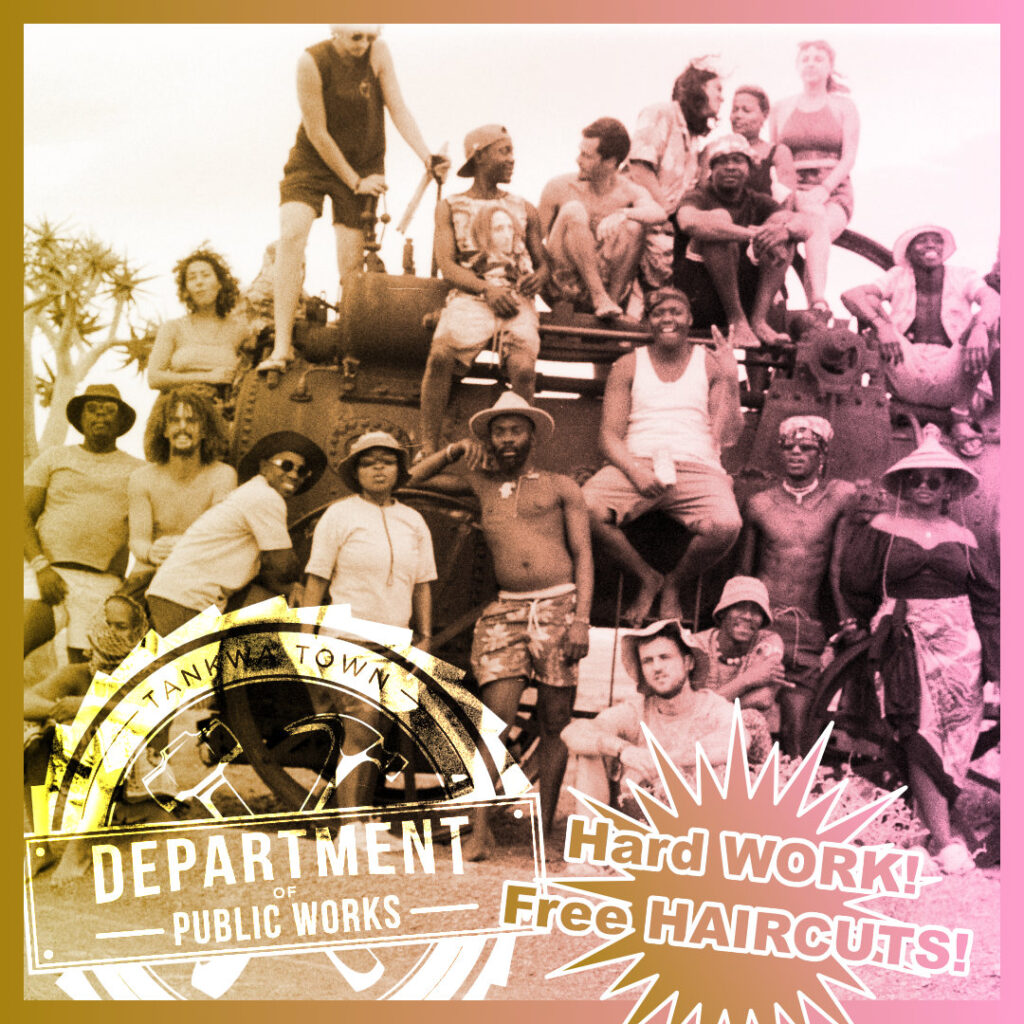
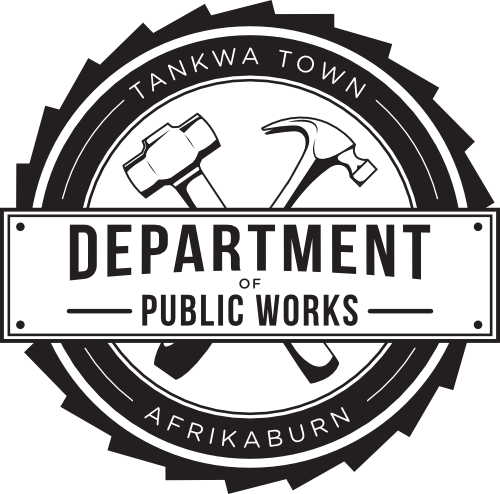
The kitchen is the beating heart of DPW. The only crew with 3 deadlines a day and a walk-in cold room. We keep DPW fed as well as all the medics, fire teams, operational teams, rangers and volunteers. Up to 300 people, 3 meals a day … No Problem for the kitchen crew.
They are the first to rise and often the last to stop working. The kitchen is one of the hardest working crews in Tankwa Town, with the biggest hearts, banging tunes and the best recipes.
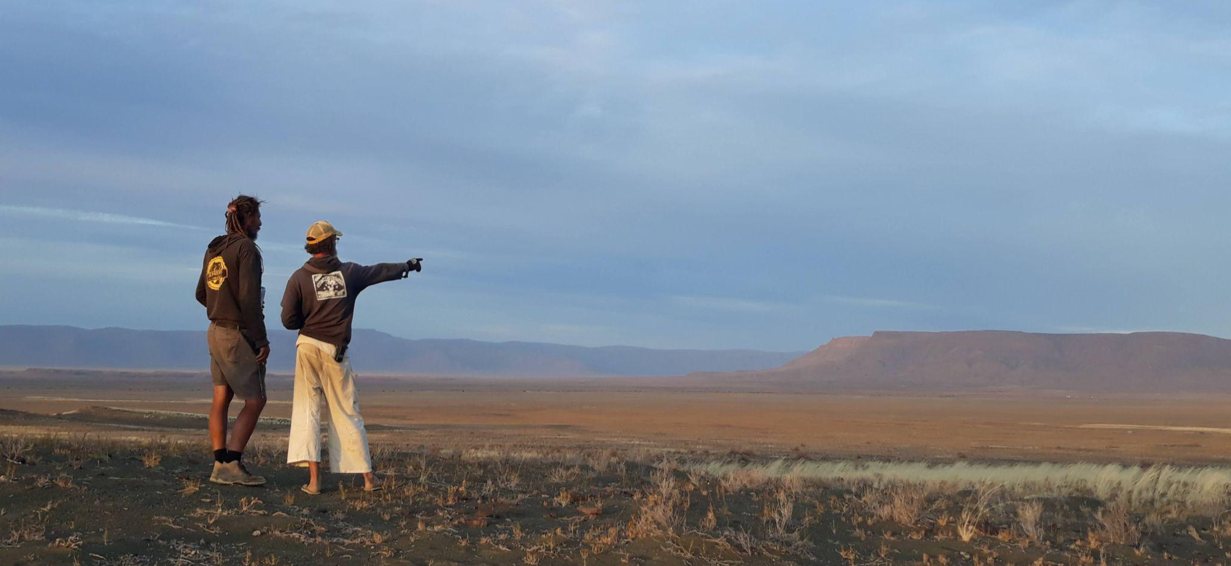
Photo Courtesy of Heather Rodwell
The first marks made in the dust … These people know everything about where anything goes, including the roads. Working closely with town planning and theme camps they create the framework from which the city grows upon. Like the idea of seeing the whole site first hand, don’t mind moving rocks around in the sun? Then this is the department for you.
Let there be light! (and cold beer)
It takes a lot to build a city, and we wouldn’t be able to do it without our electrical grid. Lights, fridges, radios, comms of any kind, the doef doef (which we love) all rely on this hard working crew. Streetlight maintenance is aided by our uniquely tall service vehicle called Bluebell.
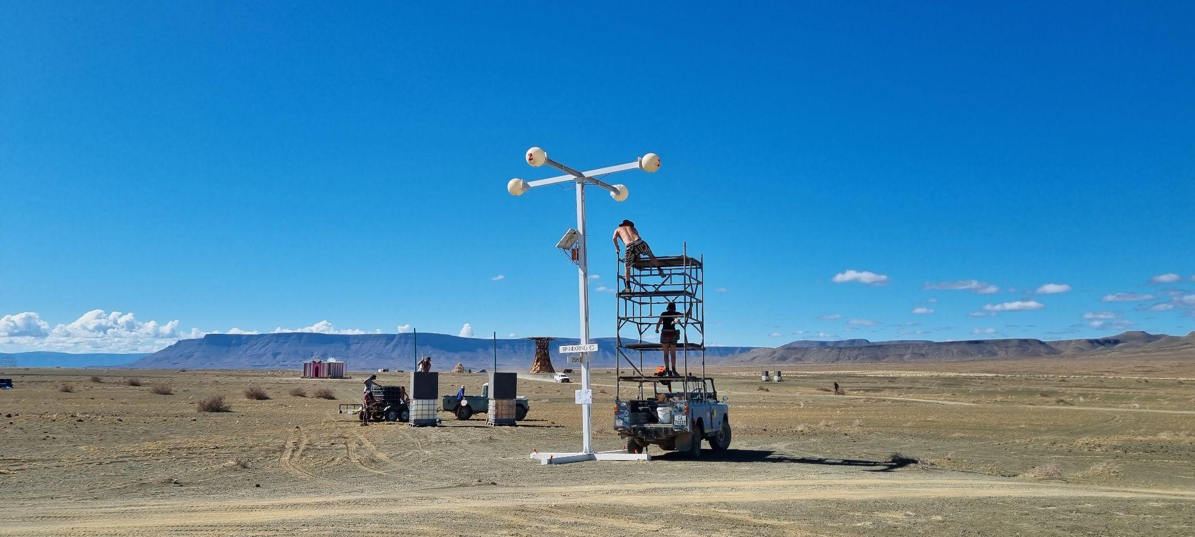
Photo Courtesy of Janine Webster
Quaggafontein is far from anywhere really, therefore we have our own fully functioning group of workshops. Carpentry, metal and the paintshop. You name it, we build it. Decks, benches, coffee tables, blackboards, floors, lamp posts, the air control tower, booths and much more are all built from scratch and painted on site. Our precious tools are all kept safe by the Quartermaster.
Remember those floors, lamp posts etc. that we just mentioned? They all need to go somewhere. Think loading and unloading trailers, crane truck and forklift antics, tetris wars and logistical planning. It takes strong hands, organisation and team spirit for everything to find its right place in the sun.
(the crew with the highest satisfaction rating in 2023!)
Our Loo crew ain’t afraid to get down and dirty. They build the toilets, keep the toilet paper buckets stocked and the loo’s looking fresh. There’s nothing quite like a loo with a Tankwa view. After the event, we process everyone’s toilet contributions into ‘humanure’, a highly valuable resource created out of waste. Look out for the toilet run teams every morning, they always appreciate a helping hand.
Water is life, and a crucial part of keeping us fed, clean and healthy in the desert. The plumbing team sets up all the infrastructure for drinking water, washing up, showering (yes DPW does shower) and grey water. Ever found yourself inside a jojo with a scrubbing brush and a bar of soap? … A regular for the plumbing team.
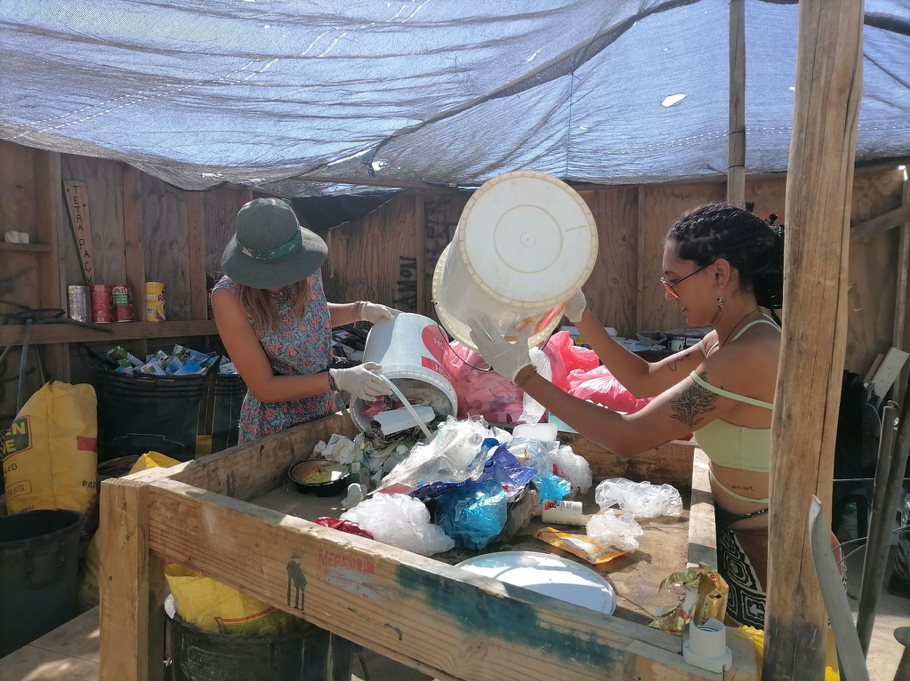
Photo Courtesy of Sarah Diederichs
DPW aspires to Leave No Trace of their own when we leave, and therefore has its own recycling depot. This team sorts and bales all our waste and loves the occasional incinerator party. They, along with the toilet crew are the unsung heroes of DPW, handling any hazardous waste … You can’t keep secrets from recycling.
There’s no denying the desert can be a crazy place to work. We’re a family, and like to look after each other. Crew welfare and the fluffers are dedicated to making sure everyone has the best possible experience on DPW. These guys are your go to for any reason, they provide icy drinks, hugs, snacks, safety gear, heart to hearts, sunscreen or a shoulder to cry on.
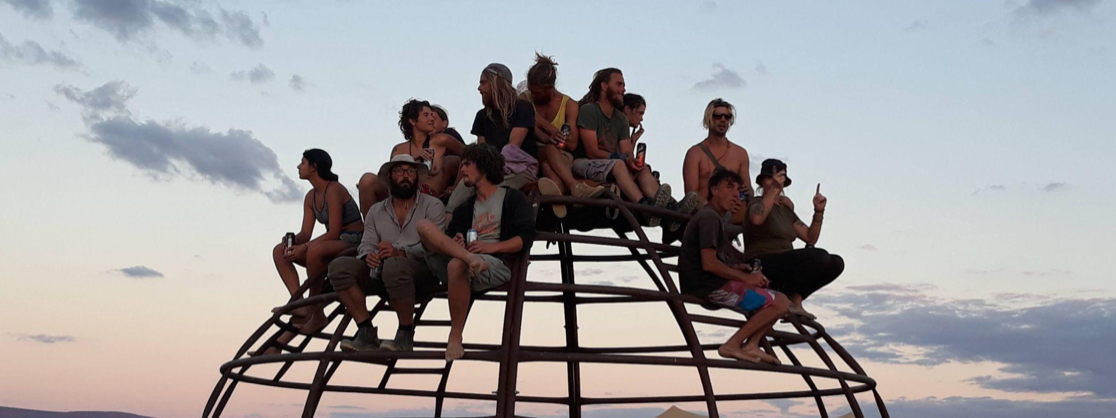
Photo Courtesy of Heather Rodwell
Every year, a vast open stretch of Karoo gravel becomes a blank canvas for our wildest imaginings. The result is a burst of beauty, colour, fantasy, dreams, noise, and pure joy.
This is Tankwa Town, a temporary city created by radical self-expression, creativity, and communal effort. Everyone is invited to create.
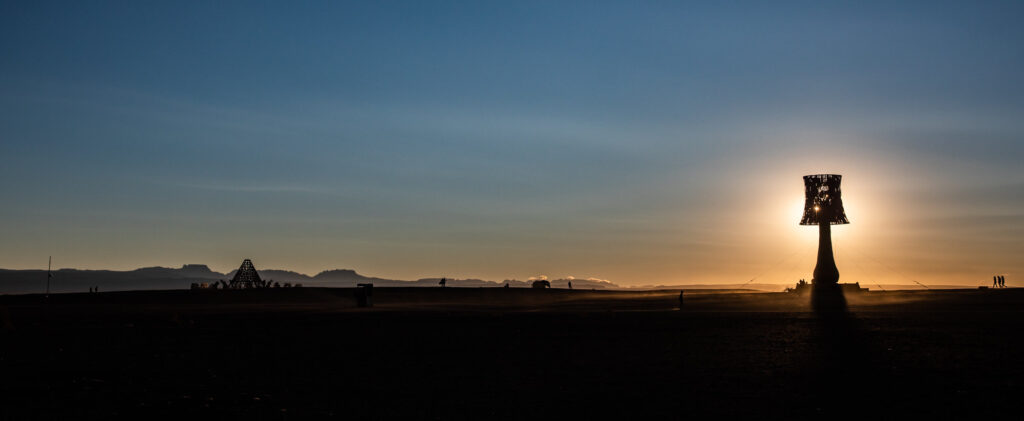
Art: 2019 Clan | Image credit: Jonx Pillemer
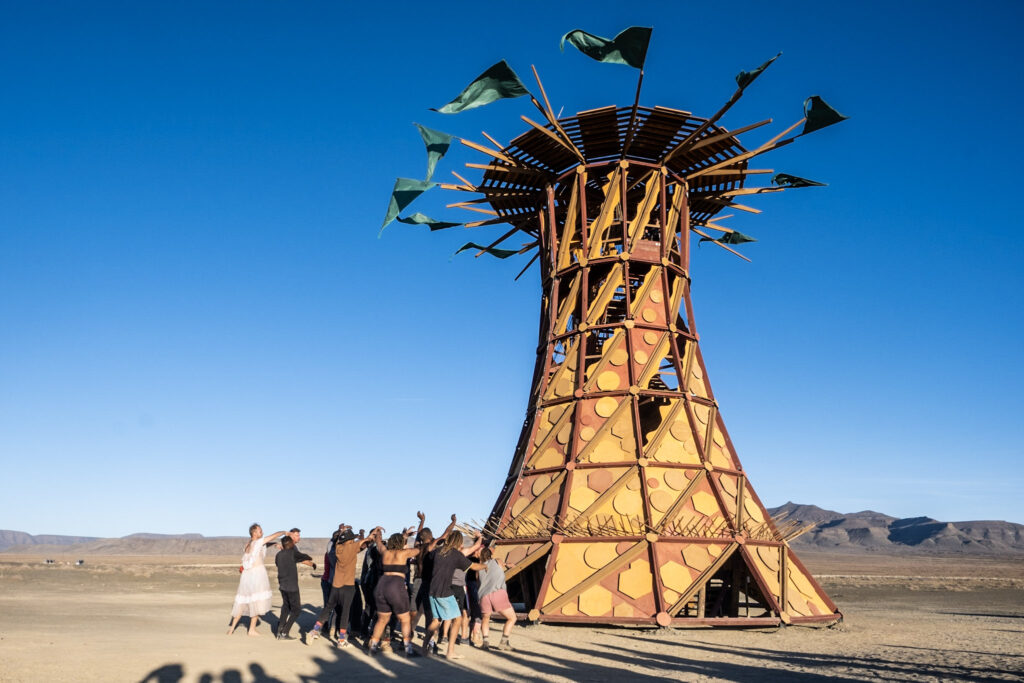
Art: Tree of Stories | Image credit: Alastair Mclachlan
Anything’s possible on the flat dusty plain of Tankwa Town – all it takes is an idea!
Do you have something in mind?
When planning an art project at AfrikaBurn, the first thing you need to know is:
anyone wanting to create art at Tankwa Town must take responsibility for all aspects of it. This starts by reading all the information available, and making the commitment to go ahead with it or not.
The second thing is everything else!
This timeline was built assuming that you start your project registration process in September-October. But it’s perfectly ok to start later than that, just that there might be some limitations to your project, and you will be filling in all the forms in one sitting; and eventually after a certain point, you don’t need to fill in any forms anymore, you bring your thing and register it on site at the Arteria.
There isn’t a deadline to register artworks, performances and Binnekring events. But there are deadlines for everything else – If you miss them, it doesn’t mean that you’re not allowed to bring art to AfrikaBurn – it just means that you’ll not be allowed to burn your piece or have a loud sound installation; you won’t have a pre-allocated space and you will not be included in the WTF Guide.
But…
You can still bring your project to Tankwa Town and have lots of fun with it!
At AfrikaBurn, creative projects are grouped into three main types: creative arts, mutant vehicles, and theme camps. As each type of project has a very different set of needs, they follow different processes and timelines.
Please make sure that you are on the right page.
Theme camps are the dorsal spine of Tankwa Town, the vertebrae of its creative community. They embody the living, breathing, and ululating essence of creative collaboration, coming together to form the two-part magnum opus that is a Theme Camp. Meanwhile, mutant vehicles are essentially artworks on wheels—mobile masterpieces that add another layer of creativity to the desert.
Together, they are the coup de maître of the sound canvas, the joie-de-vivre of Tankwa, the chef-d’œuvre of exuberant lighting shows against the desert sky—a true tour de force in the city’s party life, and the pièce de résistance in the creative atmosphere of Tankwa Town!
That said, while both theme camps and mutant vehicles are themselves art projects, they have specific characteristics that define them as such.
The myriad of creative projects that do not involve a tent nor an engine on wheels, are art projects.
(Note, projects with engines and wheels can also be an Art Project at the same time that it is an MV; the same does not happen with tents – anything that involves a stretch tent is not an art project).
From a string of balloons to a larger than life T-Rex, from a 32 ton sculpture to a didgeridoo solo piece at sunrise, from a titties parade to a khoi storytelling, from a chair with a purpose to a 74 piece live symphony orchestra, and everything in between – these are all art projects!
Artworks are stand-alone physical structures built and placed on the Binnekring (or not).
(e.g.: art sculptures, phone booths, confession booths, kissing chairs in or outside booths, a beach scene with an umbrella, etc.)
They may burn or not. They may have sound or not.
They may have a specific place or not.
Artworks that move, we call them roving artworks.
All the world’s your stage in Tankwa Town, and it’s filled with fellow performers. There is no audience, everyone’s part of the show! Stand up on a soapbox, start a conga snake, recite poetry, break into song, or perform random acts of ballroom dancing – step into the middle of nowhere and give it your best shot, break a leg, knock ’em dead!
Punk band? One man band? Riel dans groep? Skiffle player? 18-piece jazz troupe? Orchestra? Interpretive dancer? Tuvan throat singer? Maskandi? Beat poet? DJ? Great.
Just one thing: as everything in Tankwa Town is created by its citizens (that’s you), we (as AfrikaBurn) don’t book artists, or DJ’s – and all performers are all on the same level in the dust. It really makes no difference if you play in Bangkok, Berlin, Brooklyn or Bloemfontein, or how many fans you have on Soundcloud.
Because AfrikaBurn isn’t a music festival. And because it’s not a music festival
NO LINEUPS FOR OUR EVENT ARE EVER PUBLISHED.
Need a stage or space for your thing? You’ll need to hook up with another project that has what you’re after, or create it yourself.
Theme camps are often keen to collaborate with other projects – They may have the space for, and they may provide some equipment.
(We do not get involved in these arrangements.)
If you’d prefer to create and host your own shindig – Fantastic! Please go to the Information Machine and register your project.
A performance is a structured creative work that is made of human movement and it is not a physical object.
Usually it’s time bound – it happens in a place for a period of time. It can be scheduled or not.
It may move or have a specific placement, but it’s usually not anchored to the ground, and rarely has a pre-placement spot on the map.
It may have a sound component or not.
It may have a fire component, but it usually does not burn down.
If a performance involves the building of a considerable physical structure that lives in the Binnekring for the duration of the event – Please register it as an Artwork.
Even though it’s just to support the performance, and might not have creative merit on its own, Physical structures do have to go through some specific parameters.
Performances (with or without physical structures) do qualify to applçy for a Creative Grant.
A Binnekring Event is an event that happens in the Binnekring.
This refers to spontaneous pop-up events, or planned happenings on a day and time.
Anything that is a semi-organised thing happening in the Binnekring intentionally created, but not necessarily requiring months of preparation and rehearsals is a Binnekring Event – it’s like a performance that didn’t go to art school.
A Binnekring event might involve a physical structure, but that is temporary – it’s setup specifically for the doing of the thing and it gets removed once the activity ends.
Binnekring events are not eligible for a Creative Grant. They’re your gift, and Tankwa Town will love you for it!
We ask you to register your event, even just to make sure it’s listed in the WTF Guide event schedule, so everyone knows where to find it. Registering a Binnekring Event is very simple.
It doesn’t have to burn!
Just because the piece is going to AfrikaBurn doesn’t mean you have to send your artwork up in a ball of flames. We love art that burns beautifully – but we also really love art that has a life beyond Tankwa Town.
Are you thinking about burning your piece, please think about why that is – Is it important to the meaning of your piece? Is it important to you? What is the motivation for wanting to burn it? And very importantly – Is your artwork conceptualised as a burning artwork?
Building an artwork, and building a burning artwork are two very different things. If you’re intending to build a sculpture that burns remember that effectively you are building a fire that looks like a sculpture. This means that burning is an integral part of the design of your artwork.
If you decide to burn your artwork, it’s important to think about it from the start and build it into the design. If you’re not sure, we suggest that you get advice from a pyrotechnician, and If you don’t have a tame one of your own at home, you can contact us. Sooner rather than later.
Your artwork must be registered by the end of February for assessment. ArtCom and the Pyro Team will review your request based on your motivation and the design of your piece, and will let you know.
Art installations on the Binnekring may contain sound elements that might be integral to the installation, or not; those elements may be very soft, or very loud, or something else; they may be daytime sounds or not; they might not be yours too, but they might.
If the sound elements you consider integral to your piece are loud, intended for twilight hours, and permanently installed in your artwork, there’s a few things you have to do – we suggest that the first thing you do is to Reconsider.
Seriously, it’s very sound advice, start there. If it’s not ringing any bells, here’s some thinking aids you can use:
If after giving it some honest thinking, you still want to go ahead and create a party straight out of the pages of 1001 Loud-Long-Nights – Fantastic! Please carry on reading, it’s a long book!
As someone once said, “Nice things are nice when you like them!”— or so I heard from someone who heard from someone who overheard two old ladies talking on a bus in London many years ago.
If you decide to ‘sound’ your artwork, it must be registered by the end of February, and include a motivation for your artwork to have its own permanently installed sound equipment.
The Art Committee and the Sound Team will assess your request.
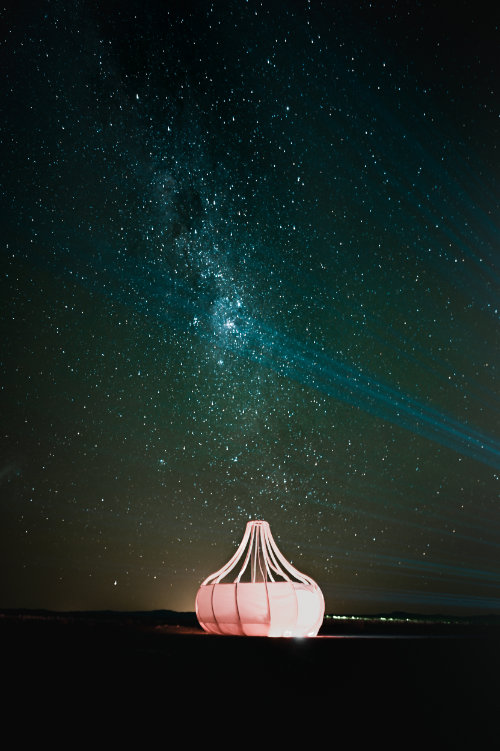
Art: Doune Cocoon
Image credit: Patrick Barylla
Registering a project doesn’t automatically (or manually, for that matter) entitle you to anything.
It doesn’t grant you a free ticket to the event, nor guaranteed access to a paid one. It doesn’t provide a stage for your performance or a place to camp. It won’t give you a supplier code, early access, late departure, or storage space on site. It doesn’t entitle you to drive on site, access an ice card, the internet, power, fuel, tools, or machines. And more.
And here’s the thing…
It’s not compulsory!
Registering your Art Project is not a requirement—it’s an invitation.
In any case, art registrations don’t close—so you can just arrive in the desert with your piece.
And your project doesn’t need “approval” (though if it’s radically inappropriate or inherently unsafe, we’ll let you know as soon as we’re aware).
So, why register a project?
You don’t have to, but you might want to…
While it’s not mandatory, we strongly recommend registering your project—because it’s useful!
The registration process is designed to help you plan your project and navigate the complexities of actualising it in the desert. It also provides us with the information we need to assist in materialising your creative intentions.
Other Advantages of Registering Your Project:
While registration doesn’t automatically entitle you to anything, it does give you access to request support for your project.
That is why.
Creative Grants provide financial assistance towards enabling creative projects in Tankwa Town. They’re intended to support projects by alleviating some of the financial burdens, but all applicants should expect to carry some responsibility for funding, or raising funds for their projects elsewhere.
Our granting process is an investment in creating the conditions for more remarkable art, and fostering opportunity in which diverse expression is originated, nurtured and celebrated. All who apply are valued, all applications are considered, and creative projects of different natures are valid and have merit of their own as a part of a fair, equitable and thriving community.
At the core, the Creative Grant funding is to cover hard costs of the project, things like materials, lighting and transport costs, for example.
The Creative Grant will NOT cover your labour at the event, performance fees, or your personal event expenses that you would ordinarily require to participate (e.g. AfrikaBurn Event Tickets, travel of the team to Tankwa Town, camping expenses like tents and food, etc.)
Of course, we do not all start from the same baseline – one size has never fitted all; and there are many ways in which art ends up actualizing in Tankwa Town. So we will be asking some probing questions to help us understand where your project fits in our funding landscape, which aims to foster a sense of belonging, not othering.
The AfrikaBurn Creative Grant process speaks to our emerging strategy through supporting (South) African participation as a systemic approach towards a diverse community and creative expression, and upholds the Principle of Radical Inclusion in the South-African social context
Everyone should be able to be a part of AfrikaBurn. As an intentional community committed to inventing the world anew, we actively pursue mechanisms to address imbalances and overcome barriers to participation, especially in light of past, current and systemic injustice.
If you are interested in applying for a creative grant, here’s some things you need to know:
1. Grants open in the beginning of September and close at the end of October.
2. If you submit your grant application nice and early, we’ll be able to look at it in advance and assist you with anything that might be needed, or that we think might make for a better application.
3. If you do it at the last minute, we might not be able to give you the help you need. If our systems go down, or you have technical difficulties; if your application is missing crucial information, or is the wrong format; etc. etc. – if we don’t give us time to help, we won’t.
4. Grant Assessment happens in November, if you apply for a grant please make sure that you are contactable during this time.
4.1. Early November: If you apply for a grant, you have to come and assess grants – The Grant Open Assessment is usually during 3 days over the first or second weekend of November.
4.2. ArtCom will be assessing grants for the whole of November, and it is likely that we have got questions and considerations for you during the Selection Phase (mid November). Please keep an eye out for any comms from us, and respond as soon as you can.
4.3. At the end of November, we’ll be communicating the outcomes. If you were awarded a grant, you will need to respond to our email to accept it (or not).
4.3.1. If you do accept the grant, we’ll need to move onto contracts and payments fast. Ideally, by mid December all contracts are signed and many are paid.
4.3.2. if we miss that window then only from mid January again.
9. Tools, equipment, other assets, and anything that can be used in another project in the future, bought with the grant money are AfrikaBurn’s, and we will ask you for it at the end of your project.
10.The grant application process is a long and detailed one—you can’t rush through it. Once you start filling it in, we don’t recommend stopping and resuming later. Unexpected events can happen, and we want to help you minimise the chances of any mishaps. To ensure a smooth application, we suggest downloading the form preview below and preparing all your answers in advance.
Pay special attention to the Budget Template—download it here, fill it in, and have it ready to upload with your grant application.
2025 Creative Grant Form Preview
Creative Grants provide financial assistance towards enabling creative projects in Tankwa Town. They’re intended to support projects by alleviating some of the financial burdens, but all applicants should expect to carry some responsibility for funding, or raising funds for their projects elsewhere.
Our granting process is an investment in creating the conditions for more remarkable art, and fostering opportunity in which diverse expression is originated, nurtured and celebrated. All who apply are valued, all applications are considered, and creative projects of different natures are valid and have merit of their own as a part of a fair, equitable and thriving community.
At the core, the Creative Grant funding is to cover hard costs of the project, things like materials, lighting and transport costs, for example.
The Creative Grant will NOT cover your labour at the event, performance fees, or your personal event expenses that you would ordinarily require to participate (e.g. AfrikaBurn Event Tickets, travel of the team to Tankwa Town, camping expenses like tents and food, etc.)
Of course, we do not all start from the same baseline – one size has never fitted all; and there are many ways in which art ends up actualizing in Tankwa Town. So we will be asking some probing questions to help us understand where your project fits in our funding landscape, which aims to foster a sense of belonging, not othering.
The AfrikaBurn Creative Grant process speaks to our emerging strategy through supporting (South) African participation as a systemic approach towards a diverse community and creative expression, and upholds the Principle of Radical Inclusion in the South-African social context
Everyone should be able to be a part of AfrikaBurn. As an intentional community committed to inventing the world anew, we actively pursue mechanisms to address imbalances and overcome barriers to participation, especially in light of past, current and systemic injustice.
Grant Applications are assessed on their individual merit, first anonymously and then comparatively against other submissions using a simple scoring system.
All applications are displayed gallery-style in Cape Town, and in Johannesburg, and are open to be viewed and assessed by members of the community. This is mandatory for Current Grant Applicants and members of ArtCom.
Points are allocated to each project using an Assessment Sheet. (If applicants have more than one representative assessing, they must complete one assessment sheet together.)
Four themes guide the evaluation of grant projects:
All Creative Grant applicants, including those from previous years, along with ArtCom, participate in the OPEN ASSESSMENT phase.
At the end of the Open Assessment period, scores are tallied, and ArtCom proceeds to the next phase.
Under this theme we consider whether the proposal is plainly funny, clever, beautiful, whimsical, interactive, new to Tankwa Town.
Under this theme we consider whether the proposal has considered its interaction and potential to engage audiences interactively at Tankwa Town.
Under this theme we consider whether the proposal shows a wider reach beyond the lifespan of the actual event in Tankwa Town.
This phase is made of two steps: Selection and Allocation; and Only ArtCom Members participate.
4. Chances of Success
At this stage, applicants’ names are revealed. The focus shifts to evaluating the feasibility of the project. Under this theme we consider how likely the team is to successfully build what they have proposed. Previous successful track records at AfrikaBurn and other projects are considered. We look at the diversity of skills present in the team and if these align with the proposal
The scores from this phase are combined with those from the previous phase to give a final numeric score. These scores serve as a guideline and are not the absolute deciding factor.
It’s important to remember that art at AfrikaBurn is not art in the classic sense. These projects represent communal effort, radical expression, and many other values. It’s not just about their appearance but also what they do.
The grant assessment process takes all factors into account.
ArtCom members, who applied for a Creative Grant and/or are closely related to an applicant, are excluded from the fund allocation phase.
Discussion and Final Selection: ArtCom discusses all projects in depth to create a final list. Detailed feedback is compiled and shared with the applicants via email.
Budget Review: Cost breakdowns of shortlisted projects are rigorously assessed, and funds are provisionally allocated. This may involve reducing the number of awarded projects or adjusting the award amounts.
All applicants are informed of their results, including feedback from the Art Committee. ArtCom reaches out to unsuccessful applicants to explore other ways to support their projects.
TEMPORARILY UNAVAILABLE.
Please come back SOON!
The Clan is a sculptural representation of a San rock painting which we understand to represent unity of intent and is the chosen central effigy at the annual AfrikaBurn event.
It is a vital part of our creative infrastructure — and it’s important that it matches the strategic pathway of AfrikaBurn, an ever-evolving work in creating the world anew.
The Clan is a commissioned artwork, carrying the opportunity and responsibility to be an agent of transformation, and as such comes with support of additional inputs for the build crew.
The Clan is a tool for development and legacy, and it’s our mission to make sure that the values it portrays are relevant in the world, and specifically in the South-African context.
 As the icon of AfrikaBurn’s identity since its first event in 2007, it stands as a uniquely South African symbol as a recognisable San figure.
As the icon of AfrikaBurn’s identity since its first event in 2007, it stands as a uniquely South African symbol as a recognisable San figure.
But where did it come from, what does it mean – and why and how did AfrikaBurn come to choose it as the icon that represents its identity?
Please read the History of The Clan
Since inception, the Clan project has been championed and interpreted by different artists each year, which has created a diversity of experience and expression.
This is an invitation for you to bring your idea into the diversity of the Clan, and add to the collective expression that shapes the Clan as a whole.
If you’re interested please read the Clan Guidelines, then draft your Clan proposal and send it to [email protected].
The Temple has developed as a part of AfrikaBurn’s physical and emotional landscape as a space of contemplation and reflection. The temple is intended as an area of sanctuary, a site of calm on the edge of the chaos and cacophony of Tankwa Town. A space to spend time with one’s own thoughts, reflect on one’s life, the lives of others, those recently passed, ancestors.
The Temple should inspire us and stimulate our spiritual awareness of nature and cosmos. While the structure may be a thing of beauty, its significance is in its transience. It is a place of letting go, a place of release. It is the pinnacle of our celebration of immediacy and catharsis.
The Temple is a commissioned artwork, carrying the opportunity and responsibility to be an agent of transformation, and as such comes with support of additional inputs for the build crew.
The Temple is a tool for development and legacy, and it’s our mission to make sure that the values it portrays are relevant in the world, and specifically in the South-African context.
If you’re interested please read the Temple Guidelines, then draft your Temple proposal and send it to [email protected].
Mobile art? Damn right! At AfrikaBurn a piece of mobile art is called a Mutant Vehicle and they can include motorised …anything, really. Cars. Bikes. Couches. Bars. Jellyfish. Bees. Mice. Bunnies. Zebra. Pacman. You get the picture.
But to drive your mutant vehicle, it has to be significantly modified – and licensed by our Department of Mutant Vehicles (the DMV). If your car looks like a car, and doesn’t invite participation, it won’t be allowed to drive around.
The same applies to e-Bikes: any electrically-powered vehicle (scooters, trikes, tuk-tuks etc) with over 400 Watts of power must be mutated, and registered.
To find out more about e-Bikes, please see our policy here.
If you are thinking about bringing a Mutant Vehicle to AfrikaBurn please download and read the guidelines:
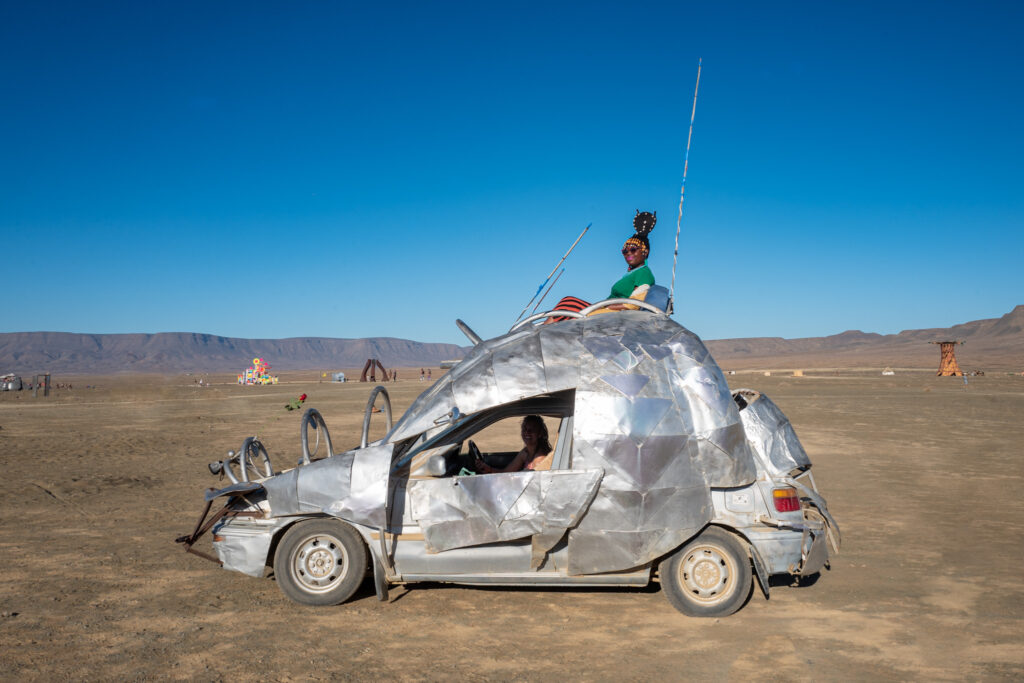
Mutant: Armadillo
Image: Reza Assar
PLEASE NOTE:
You must register your MV well before you leave for Tankwa Town. Please don’t arrive at AfrikaBurn with an unregistered MV, as it will be grounded (which would be kak).
NOTE:
– Registration of Mutant Vehicle info for our WTF Guide closes at the end of March.
– Final registration date for Mutant Vehicles is midnight 5 April 2025.
To register your Mutant:
Upon arrival, all MV’s must be brought to the DMV Testing Station at 6ish and Binnekring. There the DMV crew will check that your MV has been acceptably modified, and will then license you to cruise around in your creation. No license, no cruising – this applies to day or night driving (both of which require a license).
Level 1 is a normal car stereo without sub woofers or engine squeaks or unicorn farts, etc. This level permits you to play in most areas unless it’s a silent zone near the temple or other silent art works.
Level 2 any amplified sound, like a taxi. This may only be played in special areas within the Binnekring and deep tankwa.
Level 3 large club or stadium size sound, ie: really loud. These system may only be played at full volume in loud zones with speakers pointing away from Binnekring.
Please be very aware of quiet zones, and the 2am sound cut-off zones, and silent art works; and which way your speakers point. Please consult SOOP map which will be explained to you when you do your final licensing at DMV.
Theme camps are designed and created with the intention of welcoming, engaging and entertaining other participants. Think of them as little spaces within the larger village of Tankwa Town. You’re collectively creating a spaceship open to all who want to participate, and generating a fabulous project to share with the community.
… a sunset margarita bar, an afternoon braai and ice-cream station, an epic party, a soulful sound experience, a massage centre, a chill space, offer comfort, a talk, a demonstration, lost mind insurance policies, a water fountain, a bakery, a dance class… what are you good at that others would enjoy, and that you’d like to share?
Your camp can be tiny, it can be enough for 2 or 3 guests at a time, or a dozen, or it could go full massive and be large enough to handle hundreds of people – no matter the size it’s all welcome, and we suggest you try and tackle a camp that suits your crew size, and your resources.
If you’re thinking about creating a theme camp, please read the following docs:
Theme camps are the pulsing heart of Tankwa Town. These criteria was worked out to enable everyone to have a clear parameter in which to operate. There is a summary at the end that can serve as a check list.
Theme camps should be:
If your camp is massive with many people, don’t expect to be placed in the tightest part of Tankwa Town. Binnekring frontage is under a lot of pressure, so of your camp has many people and only a small offering to the public, please don’t expect to be placed on a busy frontage like Binnekring Road or 10ish Boulevard.
Whilst we’ll do our best to provide your camp with a great spot, placement is always at the discretion of the Theme Camp committee.
YOUR TENT AND STRUCTURES:
EQUIPMENT AND APPLIANCES:
FIRST AID AND HYGIENE:
FIRE SAFETY:
EMERGENCY AND SAFETY:
All vehicles must be parked with their ‘nose’ to the street in case of emergency
GENERAL RESPONSIBILITY & ETIQUETTE:
If you encounter a vulnerable participant in your Theme Camp, please bring them to the Sanctuary, which is next door to the Medics or alert a Ranger
The Safety Officer will come past and ensure that this is all in order before signing off your Theme Camp.
Thinking about joining or collaborating with a theme camp? Head over to our Community Directory: it’s where all registered projects are able to indicate they’re open to new members or collaborators.
Although you don’t have to register your Theme Camp, it’s a really good idea, as registered camps get a specific spot allocated to them, in the right sound zone, and get included on the map in our WTF guide. This makes your camp easy to find and explains what you’re offering, and when.
Just a tip: only registered camps get frontage on the busiest roads of our city – and those spots fill up fast. In addition, there’s a criteria that’s important to bear in mind for those spaces, ie: they need to offer an interactive experience and at night must have some lighting so there are no ‘dead spots’ on the Binnekring.
If you’re planning an unregistered camp, you’d need to arrive earlier in the week to secure an available space. Don’t panic if you miss the registration deadline for inclusion in the WTF – you can still bring it to the event. It just won’t have a designated space on the Binnekring, and it won’t be on the map or in the guide. But it’ll be there, in Tankwa Town, and that’s the most important thing.
Plug & Play Camps? Paid Luxury Glamping? GTFO!
Over the years we’ve seen some camps being set up to make profit off others’ hard volunteer work and creativity – and our team has had to intervene. Occasionally, we’ve even had to ask some individuals that sought to profit off our event by running luxury private camps not to return. Because, as should be clear in terms of the principles that underscore everything about our event and culture, that’s not how we roll as a community. To find out what the comfort & discomfort zones are in this area, check out the info on our Plug, Play & Profit page.
To register a Theme Camp, you’d first need to create a Collective (which is a group for your project crew) on The Information Machine, and then register the Theme Camp under your Collective. Ready?
NOTE: Registrations for 2025 close on the 28th February.

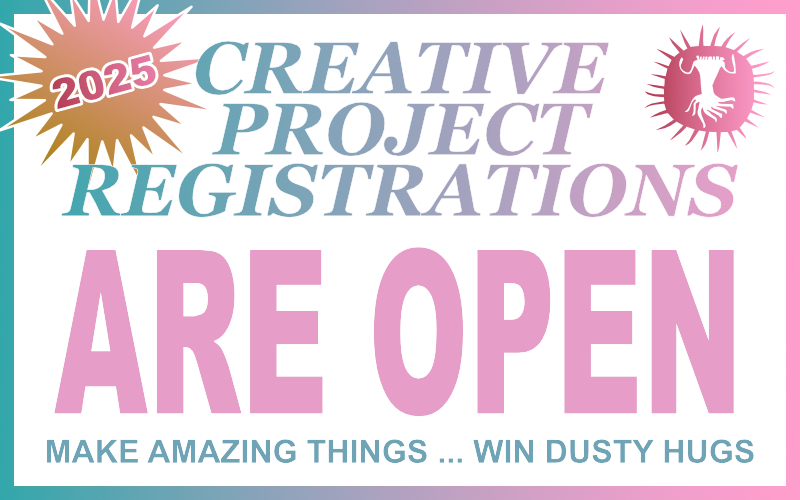
Once upon a time, there was a funky little desert kumbaya that got real popular as it grew up. But as things got bigger, some folks just wanted to rock up & enjoy the fruits of other people’s labour of love. They were keen on the action, but just weren’t up for working for it, or getting down & dirty in the dust. So they sought out ways to pay for their comforts, and some people were keen to provide that comfort, for a tidy profit.
The End? Nope – because that’s not how Tankwa Town works.
With growth in popularity, the AfrikaBurn event has experienced a rise in the commodification of our culture in the form of people and organisations that have utilised the event to turn a profit. These camps and package tours have various names: ‘Turnkey camps’, ‘Plug and Play camps’, ‘Concierge camps’. For our purposes here, we refer to them as Plug, Play and Profit Camps.
Camps of this nature compromise the experience of actively participating in the creation of Tankwa Town, as well as the culture that it espouses which aspires to affect the world in a positive way. It results in people missing the fundamental point of the experience altogether and goes against the efforts of everyone else at AfrikaBurn that participate for the love of it – not the love of profit.
Radical Self-Reliance, Decommodification, Civic Responsibility, Gifting, Participation and Immediacy have been highlighted as the principles that stand the greatest chance of being compromised by Plug, Play and Profit camps. (see here for a detailed explanation of the guiding principles).
Through consultations over many years, our community has voiced the opinion that Plug, Play and Profit camps go against our 11 guiding principles and compromise the essence of the experience. And so our Theme Camp team have developed mechanisms to ensure that some basic rules of play are adhered to. The main mechanisms utilised are these:
What does that all mean? Read the Plug and Play Guidelines here.
A easy to check reference guide is outlined below:
CAMPERS:
CAMP LEADS:
First things first: please don’t use the San Clan emblem, or the date badge from our website, on your promo material in a branding fashion. We’re a decommodified community and organisation, and wouldn’t want our identity used in a context that could create the impression that AfrikaBurn endorses, or is associated with, any brands.
If you use our identity it can create the impression that your event event is ‘organised by AfrikaBurn’, which can be problematic. More than that, your events are an opportunity for you to develop your identity as a Theme Camp, Mutant Vehicle, Artwork or Performance. Use that to your advantage.
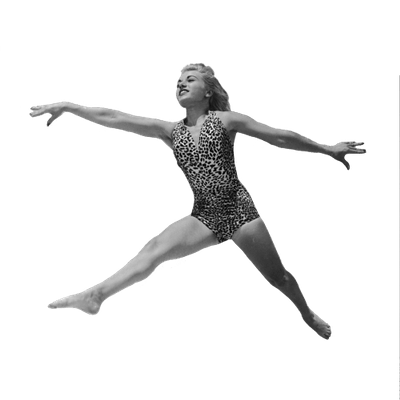
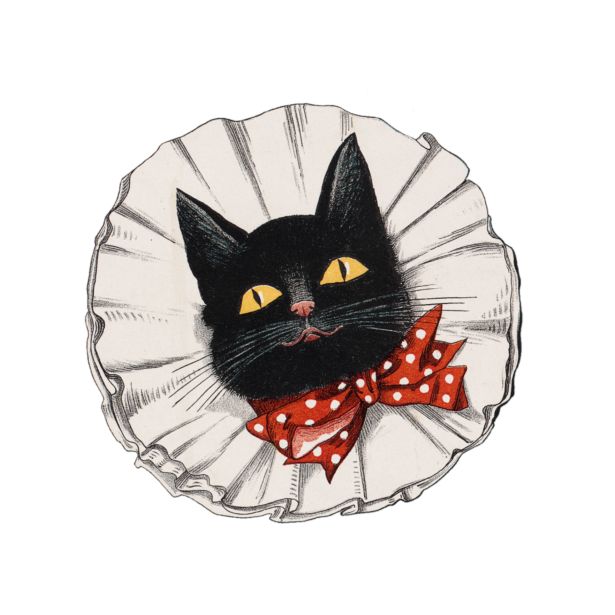
An official AfrikaBurn fundraiser event (such as our Decompression and Streetopia events) has to have proper Health & Safety plans in place, an event permit and a host of other legal requirements. Please note: the use of wording also applies to Decompression – as tempting as it might be to call your post-Tankwa event a ‘Decompression’, we do ask that you avoid using that name, as it also creates the impression that it might be the ‘official’ Decom – but if it’s not, it’s not.
Feel free to mention AfrikaBurn in your Facebook group name and in your fundraiser promotion but please make sure that it is only in reference in a sentence.
e.g. CAMP CARROT – a project for AfrikaBurn
or CIRCUSACT – a theme camp fundraiser for AfrikaBurn
or CATALYST FUNDRAISER – an art installation for AfrikaBurn
Your project or event name is the star here – make it the largest and most noticeable text.
RADIO FREE TANKWA NEEDS PUBLIC SERVICE ANNOUNCEMENT!
If you’re in touch with members of our community who have projects, or would like to inform our community about your project in the dust, please consider creating PSA’s for your community radio station, or suggesting to others that they do so.
It’s really easy and anyone – even a sleeping infant two-toed sloth – can create their own PSA’s. Here’s how:
Download Audacity (it’s free and easy to use) or use other sound software. If you need an Audacity tutorial, there’s a useful one here. Then send us the PSA’s at [email protected]
The Baardskeerder is available for you & your project info! Use it to promote your fundraising activities, make callouts, or simply to get your project known out there.
The Baardskeerder usually goes out every two weeks from January to May, and on a content basis the rest of the year.
To submit newsletter content, please click right here.
NB: Your info has to be in by 6pm the day before the newsletter goes out.
Posts on Facebook are not as easy. We usually prioritise event related information. If there is space, our communications team will post your fundraiser at their discretion, through the AfrikaBurn channels. You can also post it on the AfrikaBurn Facebook groups or event pages yourself.
There’s a really relatively helpful list of social media and community links here.
Our ticketing agent (Quicket) has kindly offered their platform for projects to easily collect money from supporters. It’s not a crowdfunding platform (like Thundafund, IndieGogo or Kickstarter) – it’s more like a donations box that makes it easier for people to contribute money towards your project using all sorts of payment platforms.
This operation involves costs, and Quicket will do it at cost price. This means you’ll pay whatever they pay in credit card and bank fees, but only that. If you’re interested, send an email to [email protected] (they’re also burners, and will do their best to help you).
This is a page on our website that lists all the projects that are open for collaboration, and allows interested collaborators to contact you directly.
When you registered your project, you were asked whether you wanted your project to be listed or not. You can go back and change your answer anytime, as well as the content about your project to be displayed on the page (if you choose to be listed).
We recommend that you update this, as and when the needs of your project change.
Check the Community Directory Page.
To change your info: Log into your Burner Bio, and click on the name of the project you want to edit. Edit the relevant section of the registration.
If you have a registered project, we can offer you an official letter of motivation from AfrikaBurn towards securing donations or discounts from suppliers and service providers.
If you think this would help, please request this to [email protected].
If your project is stuck because you don’t have a workspace, tools, enough hands on, expert advice, etc. and you have already tried everything you can to solve this and are still coming up dry, please don’t give up. Send us an email and tell us about your struggle and we’ll see how we can assist.
Remember that Radical Self-Reliance and Communal Effort are two of the 11 Guiding Principles.
Contact Us – You know how to contact us: [email protected]
And please remember the first rule of Art Club:
Always use the name our your project in the subject line of your email.
E.g. [PANTS OF FIRE] – Letter of Support
This is a huge help to keep email communication effective between us. Emails without a subject or a subject such as “artwork question” might take a long time to be answered.
Don’t forget that your fundraising event will be seen as an extension of AfrikaBurn, and its community – consider both location, and the nature of the venue, in terms of accessibility and inclusivity, and make the right choices with that in mind. It could make a big difference to the experience and the number of people able to attend your event.
In summer, energy and enthusiasm run high: it’s a great time for fundraisers. Remember that in the lead-up to AfrikaBurn, there’s a lot happening every weekend – so if you plan an event at that time, you stand a fair chance of being drowned out by the many others that are happening.
Think about your dates carefully, and try not to compete with any major events that might be aiming for the same crew you’re hoping to attract.
Our newsletter, Facebook page, Instagram and Twitter account are all great methods of spreading the word, and they are at your disposal for fundraisers.
Head to the Baardskeerder’s submission page to send info in for our newsletter.
Include a brief write-up exactly as you’d like it to be printed, including all the important details. You’d be surprised how many people send info without dates and venues! Don’t forget to include the project name, date, venue, price, theme, etc. If you have made a Facebook group page and or event page, include the link for that too.
Your announcement will be included in the next newsletter – usually within two weeks.
You’re welcome to post your event info on our main page – and event pages – on Facebook. There are also numerous other pages and groups out there which would be useful to broaden your exposure – use them!
You can find a handy list of many of the AfrikaBurn-related pages and groups on social media on our Community Links page.
Follow @AfrikaBurn, and #tag us, and we’ll be able to pick up on the content.
One word about asking our Communications crew to punt your event: whilst they’re happy to help from June to December (which is our annual ‘quiet’ period as far as communications about our main event goes), it’s not possible to promote your event from January until the end of May, as our channels need to be kept clear for important announcements.
As it happens, our crafty creative team has put together a helpful PDF that provides lots of valuable tips that will assist you in making the best decisions for your planned fundraiser. You can grab the Fundraising Guide here, read it, and share it with your Collective crew members.
Good luck with your fundraising! Get creative and think out of the box – there are many ways to raise funds. You’re resourceful – make it happen!
While we actively encourage our participants to leave their cameras and mobile phones at home, AfrikaBurn is such an amazing visual treat that you may want to bring your fancy-pants camera to Tankwa Town and try to take that Photo of a Lifetime™.
However, as AfrikaBurn is an event that is held on private land, you can’t simply arrive and start snapping away.
If you plan to take images and capture media in any shape or form at AfrikaBurn, and you would like to share that content anywhere outside of your own devices, then you will first need to read and understand our Rules and Etiquette Document and (possibly) also need to apply for media accreditation.
We take individual experience, personal space, and privacy very seriously at AfrikaBurn, and if you do not follow the guidelines, then you may find your own AfrikaBurn experience very uncomfortable.
If so, you must be registered and accredited as press or media.
We have very strong copyright and protection of personal information agreements within our ticket terms and conditions.
This measure is in place to protect our participants and artists from having their creations used without permission.
There is further detailed information in the ‘registration and accreditation’ drop-down below, but in order to gain access to the event, you must get accreditation. If you are in doubt … please contact us and register (we love having accredited media on site and are very nice).
For example, if you plan to:
You have to register and be approved as media using the form below. Once approved as media, unless you are an enthusiastic amateur, you must also sign the Tankwa Town Media Agreement document. This gives our community full control over how your content captured at the event can and cannot be used.
Despite the need for all the above, we absolutely love working with respectful and ethical members of the press, documentary filmmakers, photographers and creatives. All the images you see on this entire website have been gifted to us to use by past participants and have been captured and shared in a responsible manner … it’s just the right thing to do.
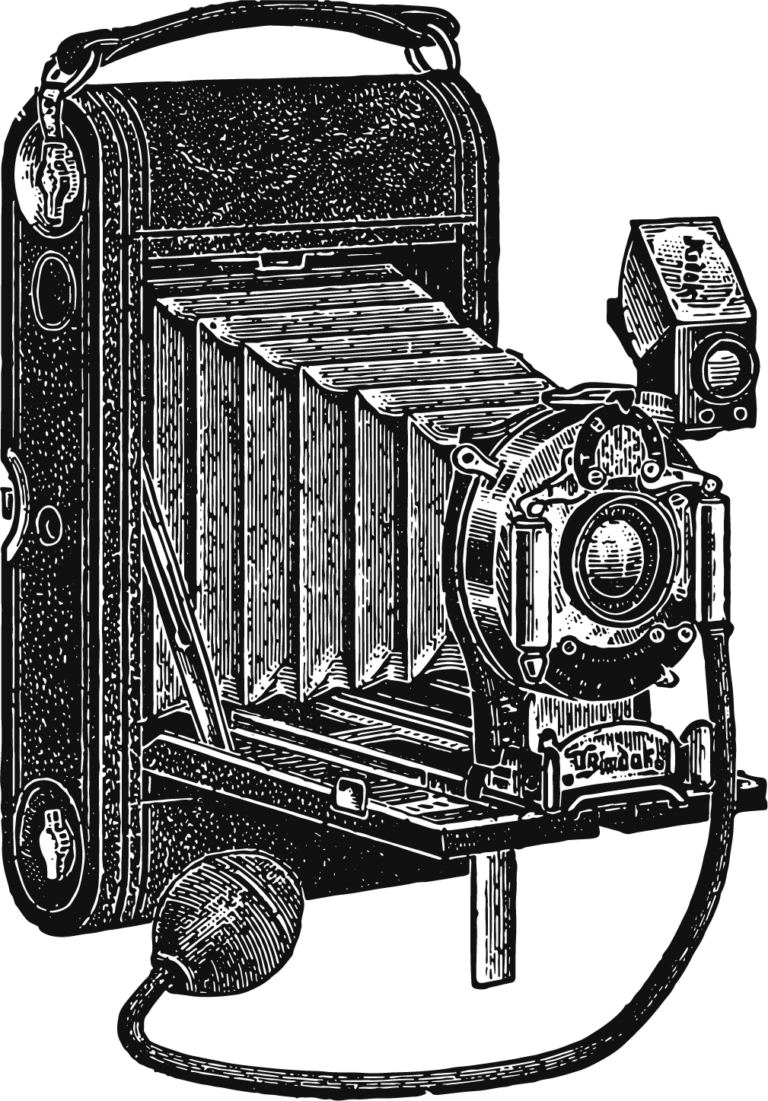
There aren’t many rules in Tankwa Town (and everyone’s agreed it should stay that way). But, when it comes to photography and film, etiquette is all about common sense and respect: ask first.
This golden rule about consent is a very big deal in a space where people are undressing expressing themselves in ways that they wouldn’t necessarily want shown or published in public – and it applies to everyone at the event who’s interested in shooting film, taking photos or reporting on the event.
So, whether you’re a happy snapper with a point ‘n shoot, a professional photographer, or even taking shots for a media title, you need to be 100% respectful of people’s right to privacy. Even if they’re naked as the day they were born, the onus is on you as the photographer to request permission if the image you intend to record would in any way infringe on another person’s rights.
One important thing to bear in mind about AfrikaBurn is that it’s not a public event – it’s held on private land, with access limited to those who have tickets. This means that unless you have express written permission to publish people on photos or film, you can’t.
Why? Because it’s kak against the spirit of what we do to publish your fellow participants in the media without their knowledge – especially when the person you plan on photographing is naked or semi-naked. In the same sense that you wouldn’t want your photo taken and published without your knowledge, taking pictures of other people – no matter whether naked, fully clothed or asleep – without their permission is unacceptable. This includes images that could make their way onto social media sites or be featured in the mainstream press.
Suppose you’re taking shots of inanimate objects, art or landscapes. In that case, these considerations change – but in those instances, if you’re shooting an artwork or other creation, it’s good practice to attribute those artists and creators where possible. If you don’t know the name of an artwork, Mutant Vehicle, or Theme Camp, check out Quaggapedia for the details – or just ask someone. The team at our Arteria (located right next door to Off-Centre Camp) are at your disposal: you can always ask them for the ID on artworks and artists – and they have event guides available for you to use for the same purpose.
Though there are lots of festivities at AfrikaBurn, in essence it’s an arts event that attracts people from all walks of life who are involved in myriad projects that come to life in the desert. It’s not a music festival.
So, in your pursuit of your story, consider your focus. If you’re planning a video about pretty people making duckface on dancefloors, you’re really not adding anything to the smorgasbord of colourful content already available on the internet. However, if you plan to hone in on artworks, personal stories and the creative process? That’s the kind of storyline and content that does justice to the hard work and creativity that’s on show in Tankwa Town. It will be more popular.
If you’re applying for accreditation, know this: proposals that keep the essence of the event in focus are favoured above any other, as the art, mutant vehicles, magic, costume and décor created and gifted by the thousands of participants is where the real story lies.
If you’re only looking to capture the dancefloors at our event, perhaps consider other events – because (much as we love and respect the crews that pour their hearts into incredible immersive sound spaces) there’s a lot more to AfrikaBurn than sound systems, dancefloors, and sparkle ponies.
If you’re aiming to shoot a music video, promotional clip or get footage at AfrikaBurn that’s aimed at marketing a product, please be aware that permission and accreditation are not provided for projects of that nature.
Why? Because – in line with our principle of Decommodification – our community doesn’t seek to profit off each other or use our culture as a backdrop for commercial enterprise. This includes using AfrikaBurn, or the artworks and people who make the event what it is, as props.
So here’s the deal: as mentioned, personal use of photos, whether kept for private use or shared on social media, is fine – though the usual rules of consent and consideration still apply. However, with the rise of Instagram and Facebook, new aspects to using photos taken at AfrikaBurn are worth considering.
For example, can you take photos of people at AfrikaBurn to promote products such as clothing, costume wear or accessories by @ and # tagging them on social media platforms?
The short answer: no.
Just like a camping gear or clothing brand, or commercial film shoot of any kind, would never be permitted to come to the event and make use of the art, people and creative contributions as a backdrop or set for their shoot, so the same applies to influencer shoots – or shots shared after the event that seek to draw attention to the products featured in the image or video footage. There may be many other events where this form of promotional use of images is absolutely fine – but AfrikaBurn is not other events: it’s an explicitly decommodified space. In other words, nothing in Tankwa Town can be used as a photogenic background for any commercial entity, brand, service or product.
If and when this does happen, our Comms team will step in and request that the content be removed – and anyone leveraging our event or community by using them as a backdrop for a brand photoshoot (on Instagram or anywhere else) can be refused entry at future events.
Civil aviation regulations that apply to drones & UAV’s have rapidly changed over the last few years, with the result that any drone-mounted camera footage is now strictly controlled, especially near areas such as active airspace and over people and populated areas (both of which our city features).
Only drone pilots that are fully certified and permitted in line with CAA regulations are able to apply to shoot airborne footage in or near Tankwa Town.
Recreational drones are not permitted, under any circumstances.
If you have any plans to capture stills or film from a drone, you would need to follow the same registration process as all other registered operators of flying and aerial craft. For more info, read up on the guidelines on Quaggapedia.
Need to contact our team regarding film, photography, blogging or media? Email [email protected]
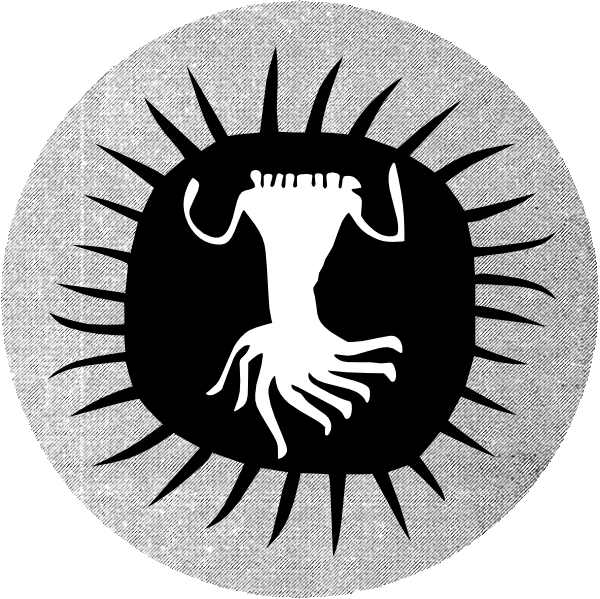
To obtain accreditation, you must please fill in the form below, a part of which is to submit a detailed proposal of what you plan to cover, film or shoot at our event as part of your application.
All photographers need to be aware of our Media & Photography guidelines. You can read and download the Rules & Etiquette doc
Accreditation applications for our 2025 event close on March 26th 2025.
PLEASE NOTE: Accreditation for AfrikaBurn does not entitle the recipient to any benefits (including tickets), and the right to refuse accreditation applications is reserved.
This information pack provides links to South African history, data and statistics, diversity theory and a couple of simple practical exercises, to help us better understand AfrikaBurn within the context of the Burn Community and AfrikaBurn within the context of South Africa and the African continent. It’s an opportunity to bring awareness to own power and positions that we carry as individuals.
Bolded links to articles are must reads.
Other links provide background and are recommended reading.
4 Ways White People Can Process Their Emotions Without Bringing the White Tears
Things White People can do to process their emotional responses to conversations about race
That’s amazing; the gift of music is one of the greatest joys in Tankwa Town (just not in the quiet zone). Whether you DJ or sing, play guitar or penny whistle, your performance on Quaggafontein should be given freely and without any expectation of compensation (other than a big round of applause). This creates an opportunity for you to connect with the Tankwa Town residents on a much deeper level than if you’d booked the Sydney Opera House and performed for all your mates who like exactly the same tunes as you.
When a performance or DJ set is gifted, it is given out of a sense of love and passion for the art form rather than for any other type of gain. This creates more meaningful and authentic experiences and is what delivers the magic that you only get at a Burn event (compared to Coachella or Glastonbury).
It’s very important to our community that, as a decommodified space, you do not see the AfrikaBurn event as an opportunity to promote your DJ career or brand. While it’s essential to credit any creative performance appropriately, we encourage you to free yourself from any perception of the default world and perform entirely anonymously.
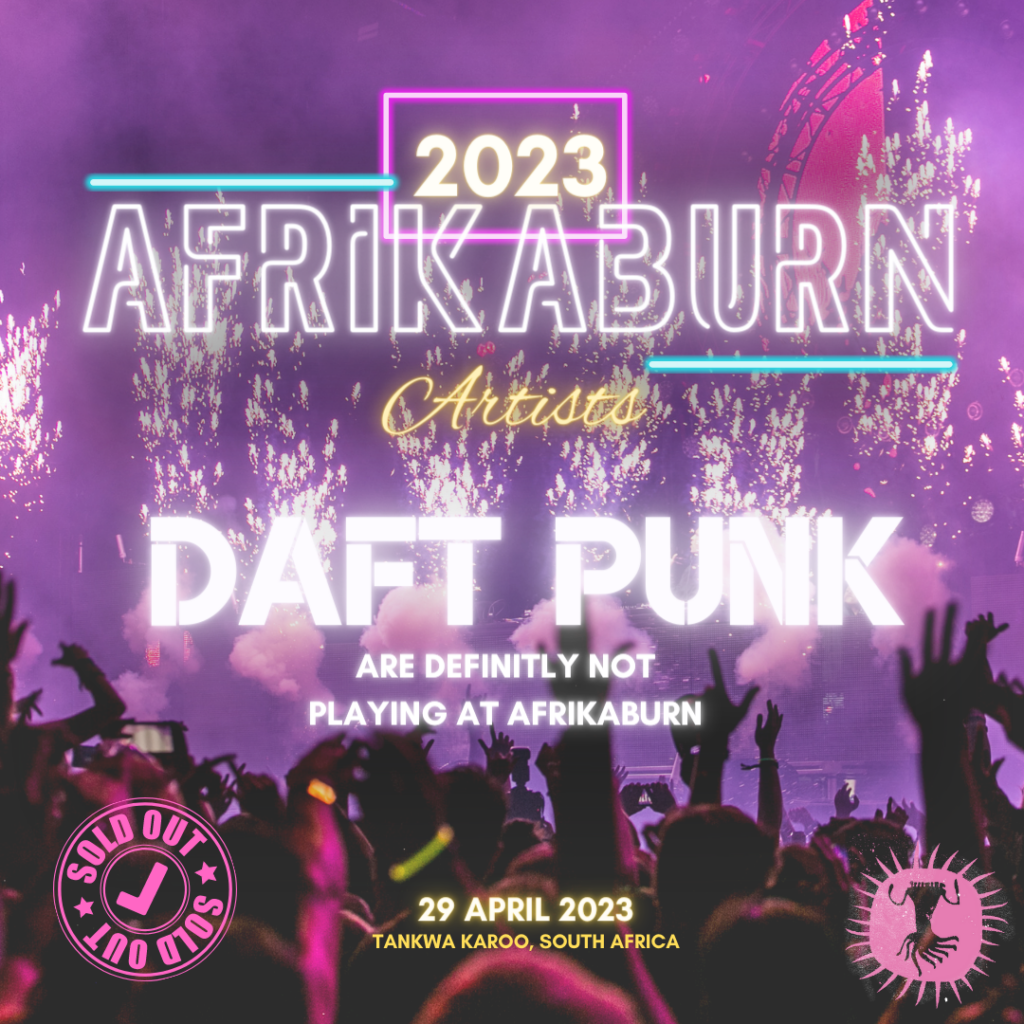

How cool would it be to go and see a random band called ‘The Churnups’ and then discover it’s the Foo Fighters? When you’re in Tankwa Town, we encourage you to be more like Larry Lurex instead of Freddie Mercury.
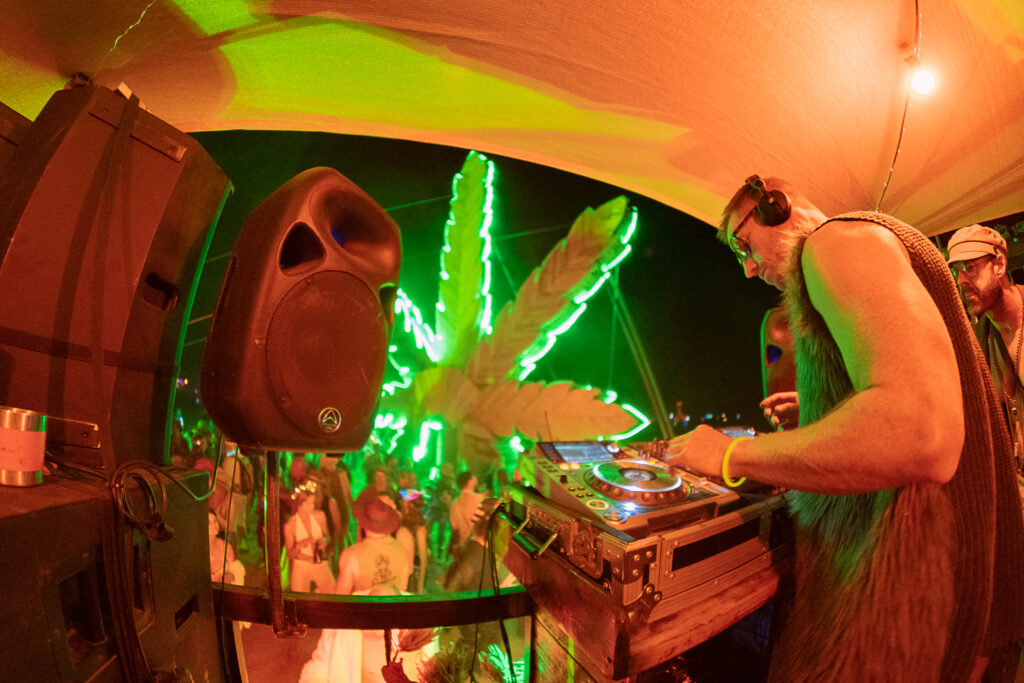
After the event, we encourage you to share any performance or DJ set in the default world in the same manner. If you really want to share your set/performance from AfrikaBurn, please don’t do it in a way that makes it look like you’re a resident act at AfrikaBurn to get opportunities in the default world. Use your gift to teach others why AfrikaBurn is so great as a decommodified and unbranded space.
Have you heard of Bangers and Mash? Hopefully, only if you’ve been to AfrikaBurn … At AfrikaBurn, they throw legendary intergalactic dance parties in the dust, but outside of the Burn in the default world, nobody has ever paid to get into a Bangers and Mash venue or listen to Bangers and Mash perform. Bangers and Mash aren’t charging you extra for a VVIP ticket to their dancefloor at AfrikaBurn; they let anyone be a part of their soundscape (they also gift banging potato treats on their dancefloor).
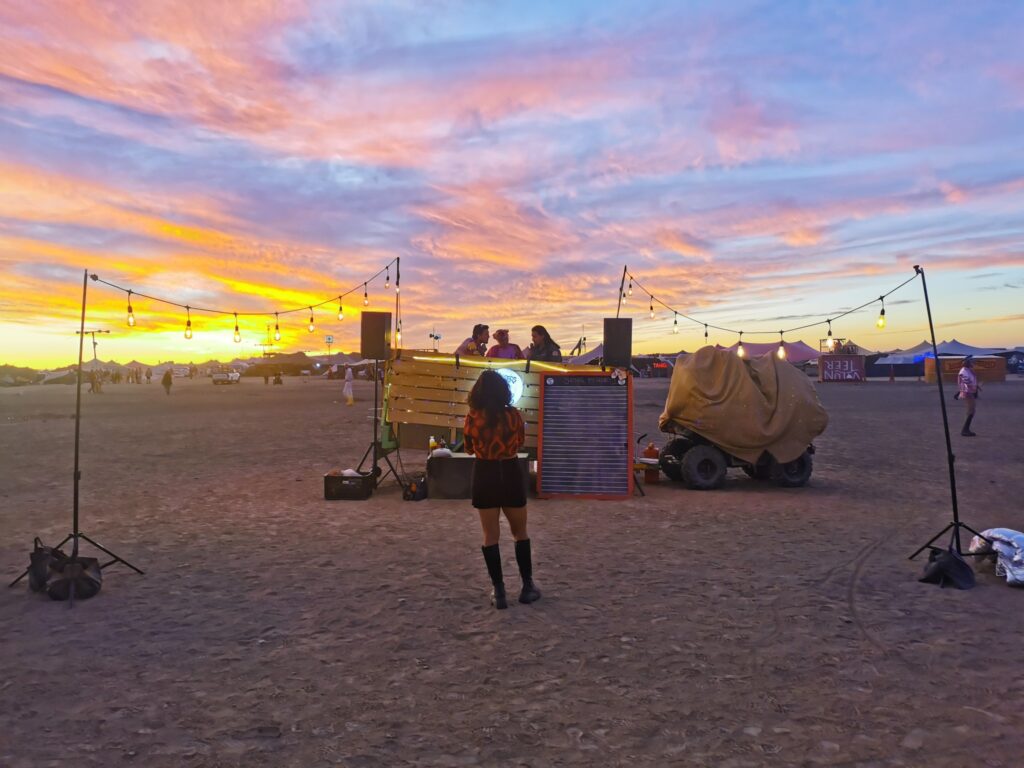
Despite the numerous emails we get from booking agents, AfrikaBurn does not book or curate any performers or DJs at AfrikaBurn. If you want to perform, Radical Self Reliance is key to finding a place to perform your music. Your best way to perform at AfrikaBurn is to start a sound-based Theme Camp or creative project … If your dream is to play a piano in the middle of the desert at midnight, then we’re not going to stop you, but it’s up to you to bring a piano to Tankwa Town and take it all home again.
You also don’t need to bring a massive rig or a double-decker bus to be able to play your music. You can start small and build your way up over time.
The absence of commercialism at AfrikaBurn allows us the rare opportunity to gift rather than sell, to receive rather than buy. It allows us to try social currency instead of transactions.
Some words on this page have been sampled and remixed from Travis Lyle and Charlie Dolman
Website developed by The Brain, Claire Shaban, and The Tim Doyle
Download Privacy Policy | Event Disclaimer | Terms of Use
Download Cookie Policy | Download POPIA Manual
Copyright 2024 AfrikaBurns Creative Projects NPC (Reg No. 2007/020812/08)